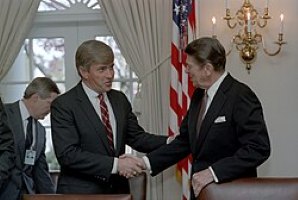(July 27) “If you’re a conservative columnist, why do you often criticize conservative Republican politicians?”
Six months back into full-time writing for this newspaper, I frequently hear this question. Or close variations thereof, such as why I tackle issues not normally associated with conservatives, such as the plight of potentially innocent death-row prisoners or the importance of various local government services.
The first answer is that a journalist, even an opinion journalist, shouldn’t feel affiliation for a political team. Instead, he should have principles that he applies evenly to everybody across the political spectrum.
The second answer is about the content of those principles: In the last decade, many of today’s self-proclaimed “conservative” pols are pushing maxims alien to ideals that for three-quarters of a century defined modern American conservatism. Granted, the application of principles evolves, but the principles themselves should endure, and the labels (“conservative,” “liberal,” etc.) for those principles should not change meanings.
There’s an important third answer, too. Namely, neither ideology nor governing philosophy (two different things) are as starkly important at local levels. One of the central principles of modern conservatism is that essential government functions should be carried out at the most local level competent to handle them. Tasks that no conservative believes the federal government should perform might nonetheless be entirely within the proper scope of local government. Therefore, the questions become not the ideological ones about what should be done but instead the more practical ones of how to do them.
For example, the late conservative Republican Gov. Dave Treen (1980-84) created a state Department of Environmental Quality even amid national conservative backlash against the overly bureaucratic and centralized Environmental Protection Agency. He recognized that opposition to national, one-size-fits-all environmental policy doesn’t absolve states from responsibility for ecological stewardship.

Now, let’s return to the second question, the content of conservatism. In 45 years of very public advocacy for what once were universally considered conservative principles, I’ve been significantly guided by the philosophies and examples of three eminently successful politicians: American founder James Madison, President Ronald Reagan, and Congressman and idea man Jack Kemp.
Absolutely crucial both to conservatism and to Madison’s founding ideals is the belief that power backed by compulsory authority should be dispersed, not overly concentrated….. [The full column is at this link.]






